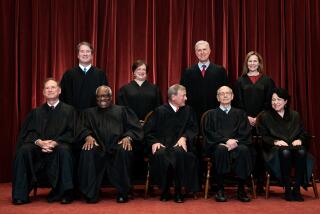Separation of Church, State
- Share via
In your editorial entitled “The Vicar of Education,” (Aug. 11, 1985), you state: “William J. Bennet, the secretary of education, has exposed his need for some homework on the U.S. Constitution.” Your opening sentence is absolutely correct, provided that one word is changed. He has not exposed “his” need for Constitutional homework, but “a” need, perhaps even “your” need, for even a cursory reading of the Constitution.
Nowhere in the Constitution can there be found the words “separation of church and state.” The passage to which I assume you refer is the first clause of the First Amendment, which reads: “Congress shall make no law respecting an establishment of religion, or prohibiting the free exercise thereof.” This restriction on Congresional power was made to prevent the establishment of a “state” church. Happily, that provision has proved to be one of the most successful of the Bill of Rights. It is the second half of that provision which has often gone neglected or even ignored. William Bennett is acting properly in his role as a cabinet official to see that it too, is enforced.
Parents have often in the past exercised their right to “the free exercise” of religion by electing to send their children to parochial schools. Only in the last 20 years has the cost of education become so prohibitiv that many parents can no longer send their children to private, sectarian schools while at the same time paying for their children’s public education via property taxes. This has the effect of preventing their “free exercise” of religion. William Bennett’s plans, voucher systems or otherwise, are simply attempts to address this Constitutional requirement. If he is circumventing the decision of the Supreme Court in doing so, then perhaps the Supreme Court decision needs to be reviewed. The fact of the matter is that the Supreme Court itself suggested that he and the justice department find alternate methods (such as vouchers) of aiding parochial schools that could pass constitutional muster.
JOHN C. EASTMAN Claremont






